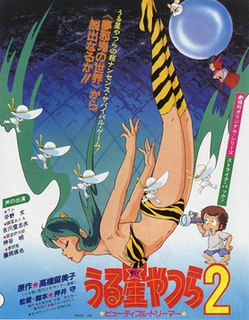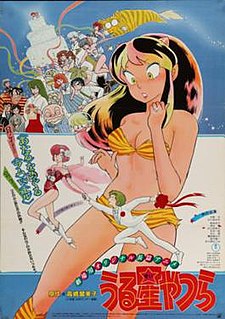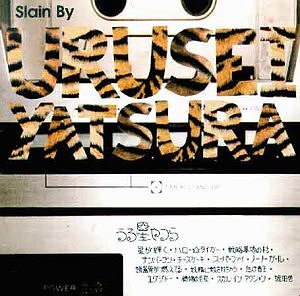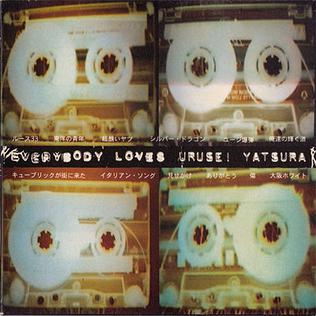Rumiko Takahashi is a Japanese manga artist. With a career of several commercially successful works, beginning with Urusei Yatsura in 1978, Takahashi is one of Japan's most affluent manga artists. Her works are popular worldwide, where they have been translated into a variety of languages, with over 200 million copies in circulation. She has won the Shogakukan Manga Award twice: once in 1980 for Urusei Yatsura, and again in 2001 for Inuyasha. She has also won the Seiun Award twice: 1987 for Urusei Yatsura, and 1989 for Mermaid Saga and the grand prize at the Angouleme Comics Festival in 2019, the second women and Japanese person to win the prize.
Fumi Hirano is a Japanese voice actress and essayist who is best known for voicing Lum Invader in the anime series Urusei Yatsura. Fumi attended Tamagawa University in Machida, Tokyo where she graduated with a degree in Theatre from the Department of Fine Arts in the College of Humanities. She is affiliated with Aoni Production.

Momoko 120% is a 1986 arcade game by Jaleco released only in Japan. The game was originally intended to be an Urusei Yatsura game, but for an unknown reason the license was not obtained for the arcade version - while the characters were changed, Lum's Love Song, the first opening theme of the TV series, still loops throughout the game. However, the Family Computer port retained the license and was titled Urusei Yatsura: Lum's Wedding Bell. The game was re-released for Mobile Phones in Japan on February 28, 2006. Three mobile phone sequels were released, Momoko 1200%, Momoko 1200% in Machigai Sagashi, and Momoko no Kasei Bowling ~La Mars Cup~, were released in Japan only in 2006.

Urusei Yatsura 2: Beautiful Dreamer is a 1984 Japanese anime fantasy comedy film, directed by Mamoru Oshii. It is the second film in the Urusei Yatsura film series based on the manga of the same name by Rumiko Takahashi. Its predecessor, Only You, was also directed by Oshii. It was released in Japan on February 11, 1984.

Urusei Yatsura: Only You is a 1983 Japanese anime fantasy comedy film directed by Mamoru Oshii in his film directorial debut. It is the first in the Urusei Yatsura film series based on the manga of the same name by Rumiko Takahashi. It was released in Japan on February 11, 1983.

Studio Deen Co. Ltd. is a Japanese animation studio founded in 1975 by Sunrise producer Hiroshi Hasegawa and ex-Sunrise animators. The studio owns three subsidiaries: Danny Donghua (丹尼動画), a Chinese sub-contracting company; Megumi (め組), a sub-contracting studio; and Umidori (うみどり), which does the 3DCG found in many of Deen's works.

Urusei Yatsura, a Japanese anime and manga series, has six movies and twelve OVA releases. During the television run of the series, four theatrical films were produced. Urusei Yatsura: Only You was directed by Mamoru Oshii and began showing in Japanese cinemas on February 11, 1983. Urusei Yatsura 2: Beautiful Dreamer was also directed by Mamoru Oshii and was released on February 11, 1984. Urusei Yatsura 3: Remember My Love was directed by Kazuo Yamazaki and released on January 26, 1985. Urusei Yatsura 4: Lum the Forever was directed again by Kazuo Yamazaki and released on February 22, 1986.

Kitty Films was a production company established in 1972 in Japan.
Kazue Komiya is a Japanese voice actress who is affiliated with Theater Echo.
Shannon Hemon Settlemyre is an American voice actress and ADR voice director best known for her English voice of Lum in the Urusei Yatsura movies except movie 2. She mainly works at Coastal Studios and Swirl Recording.
Atsuko Nakajima is a Japanese animator, character designer, and illustrator. She is married to anime director and animator Tomohiro Hirata, with whom she also collaborated in the Trinity Blood anime.
Shigeharu Shiba is an anime audio director and producer. He graduated from Tokyo University of Education and went on to form the Jiyū Theatre Troupe. Shiba then joined Omnibus Promotion, where he worked on anime television series, OVAs, and movies.
Machiko Washio is a Japanese actress who works in both live action as well as voice over work for anime. To anime fans, she is well known as the voice of Sakura in Urusei Yatsura.

Lum no Love Song is the debut single of Japanese pop singer Yuko Matsutani. The single was released on October 21, 1981 and was created as the theme song for the anime series Urusei Yatsura. The song was used as the theme song from its debut on October 14, 1981 until the 77th episode released on July 20, 1983.

We Are Urusei Yatsura is an album by Glaswegian indie rock band Urusei Yatsura, released on May 6, 1996. In the U.S.A. it is known as We Are Yatsura.

Slain By Urusei Yatsura is an album by Glaswegian indie rock band Urusei Yatsura, released in 1998. It contains the band's only Top 40 hit, Hello Tiger.

Everybody Loves Urusei Yatsura is the last album by Glaswegian indie rock Urusei Yatsura, released in 2000.
Urusei Yatsura no Theme ~Lum no Love Song~/「Mii」 is the fourteenth single released by Japanese artist misono on September 23, 2009. The single was released the same day as her first cover album Cover Album. The single charted well on Oricon, taking the #18 position for the week; however, the single only remained on the charts for two weeks.










